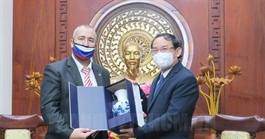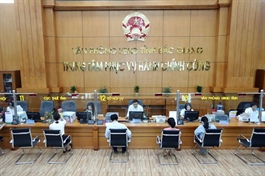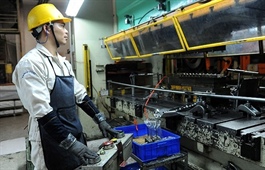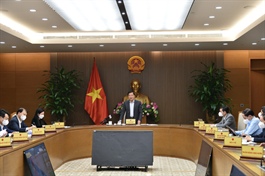UKVFTA boosts trade and investment opportunities between the UK-Vietnam
UKVFTA boosts trade and investment opportunities between the UK-Vietnam
The UKVFTA has created strong spillovers, not only in trade but also in investment from the UK to Vietnam and vice versa.
Two-way trade turnover between Vietnam and the UK has grown at a double-digit rate despite significant disruption to the trade supply chain and other economic and commercial activities due to Covid-19.
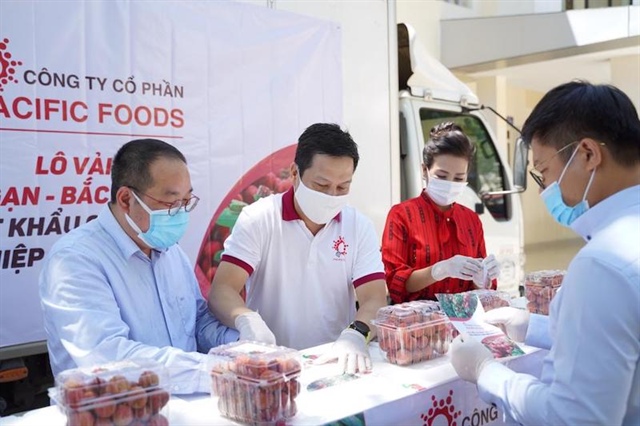
Thanh Ha lychee exported to the UK and EU countries in June 2021. Photo: kinhtedothi |
Deputy Minister of Industry and Trade Tran Quoc Khanh assessed that the double-digit growth (17.2%) in 2021 has helped the bilateral turnover between Vietnam and the UK to recover to the level in 2019, after suffering a severe drop in 2020 due to the Covid-19 pandemic impacts.
The above-mentioned results were thanks to the solid leverage role of the UK-Vietnam Free Trade Agreement (UKVFTA). Specifically, with the reduction in import duties on some commodities to 0% after January 1, 2021, many Vietnamese exports are having outstanding competitive advantages in the UK market compared to similar products of China, Thailand, Malaysia, Indonesia, and many other countries who have not signed a Free Trade Agreement (FTA) with the UK, Khanh told a conference themed “One year journey of the UKVFTA: remarkable achievement and the vision ahead” on March 15.
Luong Hoang Thai, Director of the Multilateral Trade Department under the Ministry of Industry and Trade added that the agreement has created strong spillovers, not only in trade but also in attracting investment from the UK to Vietnam and vice versa.
Statistics showed that the bilateral turnover between Vietnam and the UK in 2021 reached US$6.61 billion, up 17.24% compared to 2020, of which growth of many Vietnamese products was very high such as agricultural products with an increase of 67% and pepper 49%. Vietnam's imports from the UK also surged 23.6% last year.
In 2021, Vietnam licensed another 48 direct investment projects from the UK, with newly-registered capital reaching more than $53 million, an increase of 157% year on year, raising the level of direct investment of the country into Vietnam to $4 billion. Currently, the UK is in the group of 12 countries with the largest direct investment capital in Vietnam.
“The figures showed that the UKVFTA has helped promote bilateral trade in a more balanced direction. We are able to be optimistic about the positive impact of UKVFTA on both Vietnam and the UK,” said Khanh.
Meanwhile, Nguyen Thi Thu Trang, General Director of the WTO & International Trade Center under the Vietnam Chamber of Commerce and Industry (VCCI), emphasized the export results show the benefits of the agreement. It is even more remarkable taking into account the complicated development of the Covid-19 pandemic.
Take the opportunity to speed up
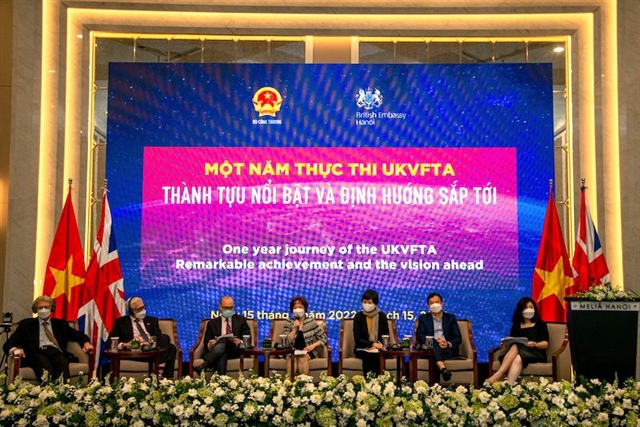
An overview of the conference. Photo: moit.gov.vn |
The UKVFTA agreement provides many incentives to Vietnamese exports. With customs duties removed for 99.2% of tariff lines, Vietnamese exports are enjoying great competitive advantages.
Under this agreement, the UK also grants Vietnam an additional tariff quota, which allows duty-free import into the UK for Vietnamese 14 items such as rice products, 36 geographical indications of Vietnam protected in the UK (including famous products such as Ban Me Thuot coffee, Phu Quoc fish sauce). Such incentives are expected to expand the market for Vietnamese exports.
However, to take full advantage of the opportunities, many delegates at the conference also suggested solutions to increase the advantage for domestic goods.
Trang acknowledged that the UK is a demanding market, so trade promotion agencies need to find more creative solutions to help businesses connect with customers, especially improve product quality and meet British standards and regulations.
Meanwhile, Dinh Cao Khue, Vice Chairman of the Vietnam Fruit and Vegetable Association, suggested the Ministry of Agriculture and Rural Development and growing areas step up training for farmers on farming techniques and control the quality of agricultural products to boost exports.
He also added the Government and the Ministry of Industry and Trade should support local businesses to more widely participate in trade promotion fairs in the UK, thus grasping more opportunities to promote Vietnamese farm exports.










